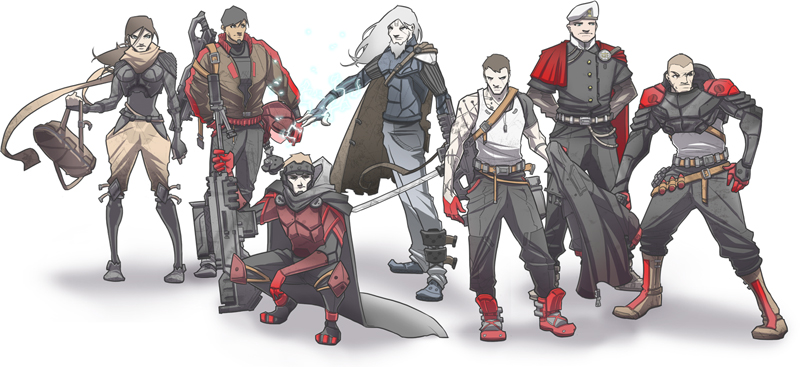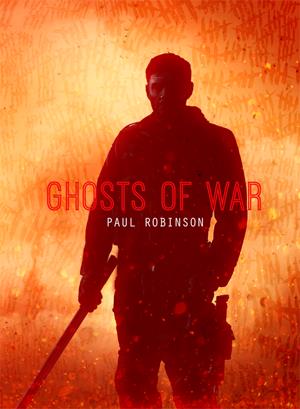Today I’m taking World Builders on a detour into science fiction, with my guest, Paul Robinson, author of Ghosts of War.
 Paul Robinson is a 28 year old author and artist from Australia. Right out of high school an illness waylaid his university/career plans and the very long series of unfortunate events that followed continued to beleaguer him for the better part of the next decade.
Paul Robinson is a 28 year old author and artist from Australia. Right out of high school an illness waylaid his university/career plans and the very long series of unfortunate events that followed continued to beleaguer him for the better part of the next decade.
But it wasn’t all for nothing, if it weren’t for all that had happened, he wouldn’t have had the time to develop this story, nor would he have found himself aspiring to be an author and taking part in this great opportunity from Inkshares and Nerdist.
When he’s not tending to his very needy cat, Paul enjoys reading, writing and absorbing as much content as he can through TV, movies or games.
Here are some of Paul’s answers to my questions, along with some of the cool art for his book.
What is the appeal of world building to you? How does it compare to the importance of character and plot?
I’ve always been of the opinion that characters come first, then story, then the world they’re in. The world could be super interesting, but if the story isn’t there or you don’t like the characters (or like to hate them) then things will have a greater chance of falling apart.
So for me world building has come in third in this book’s development, but that isn’t to say it’s unimportant. As the world has gotten more detailed it’s affected the way the story has evolved, and even in a few cases changed the the result of some very key scenes (which are far too spoilery to mention at present.)

The cast of Ghosts of War, a commission by BrotherBaston
What aspects of the world do you have to figure out before you start a story? What do you allow to unfold as you write?
I started working on Ghosts of War six years ago (at that point it was just knows as “that story thing”) and right from the start I had a few things set in stone very quickly. The main characters of Cole, Ram, Sol, Gregor, Oren & Tobias have largely remained unchanged in name or form since their inception (Kira was added further down the line). Some details of their histories have changed but for the most part they are who they were back then.
So at the outset, very little of the world was in place, but I had a good handle on the story and characters. And as they traveled from planet to planet, more incidental details were brought out and from that I was able to start building backstory for the locations and getting a real sense of what each place was.
The paragraphs describing the shipyards in the excerpt below are some of the better examples I’ve got of the world growing organically based on what the story needed. I knew that I needed a shipyard, and that somewhere in it there’d be a market district and a salvage shop. I’d like to say the way the location developed over those couple of paragraphs was planned but it wasn’t, it all just flowed out in moments and has remained unchanged since I first wrote it.
Do you have a technique for keeping track of world building as you go? How do you ensure your material is easily retrievable and easy to modify?
I tend to make a lot of lists, usually of names. I’ll create a document with the alphabet running down the page and whenever I think of a name I slot it in and make a quick note as to who they are and what they do. I might write a short paragraph but more often than not it’s a list of some kind, usually bullet-pointed.
A lot of the time though I just think about things and store them up in the ol’ brain box. I walk for 2 hours a day, every day, at a minimum, and that’s the time I use for working through story problems or thinking of backstory details or just working out where the story is going in general.
Unfortunately I’m bad at actually writing down a lot of the stuff I think up, but thankfully my memory is still (mostly) with me, so I can often recall things sometimes several weeks down the line. So it isn’t too bad.
I know I’ve lost cool things to this method though, which is a shame. When I start working on the sequel to Ghosts I’m going to try and be better about writing stuff down.
While I’m on the subject of the sequel, here’s an exclusive. The title of the sequel will be Ghosts of War: Restitution and work will continue on it later this year once the first draft of Ghosts is squared away.
How do you avoid excessive world building and balance it with the act of writing the story?
I try not to go out of my way to over explain things. Sometimes I think things can be explained to the point where they just aren’t interesting anymore. If you know exactly how something works, the magic is just kinda…gone. So keeping a sense of mystery about things is something I definitely try to do.
Also if I ever find that I’ve waffled on for so long about a particular subject or item that when I go back to the story I can’t remember where I was up to, that’s probably a good indicator it’s gone on too long. Somewhat like that sentence. Oi vey.
Thanks, Paul, for sharing your insights. Here’s some info on Paul’s book:
 Ghosts of War is a planet hopping tale of revenge and retribution. Full of action and adventure, twists and turns, and a good side of fun it’s like a summer blockbuster in a book.
Ghosts of War is a planet hopping tale of revenge and retribution. Full of action and adventure, twists and turns, and a good side of fun it’s like a summer blockbuster in a book.
Ghosts of War is currently being crowdfunded on inkshares.com and is an entrant in the Nerdist Collection contest. You can listen to an audio recording of the first 3 chapters, read by Inkshares author Paul Inman, by watching the trailer when you visit Paul’s project page.
Here is a short excerpt:
(From Chapter 6)
It was a four day trip to Nikara, and Cole was thankful that it had been largely uneventful. So much had happened in such a small space of time and he was glad for the reprieve, short though it was. They were just now entering Nikaran space and the ship yards loomed large before them. The ship yards were basically a massive space station that travelled in Nikara’s orbit, but the station itself was a lot more than just a construction yard for the Federation’s fleet of ships. It was also home to a couple hundred thousand people, many of whom were workers at the yards, but many more were refugees, private citizens or criminals trying to hide right under the Federation’s nose.
They were after a salesman.
Sol brought the ship down in one of the many commercial hangars that lined the port side of the station. The hangars were immense, stretching for several kilometres across the stations surface. Hundreds of ships were scattered along it’s length and it seemed like tens of thousands of people were milling about on the ground.
“So what’s this guy’s name again?” Ram asked.
“Kag Darka,” Cole said, “Oren said he runs a salvage reclamation place in the market district. Sol, can you find him?”
“Already on it,” Sol said, accessing the station’s directory. “Got him, he’s on the twenty third level of the market district,” –Sol started laughing.
“What?” Cole asked.
Sol managed to compose himself. “His shop,” Sol said, “it’s called The Darka Side of Salvage.”
“Wonder how long it took him to come up with that?” Ram said.
“Probably longer than it should have,” Cole said.
“I think it’s quite clever,” said Gregor, popping his head into the conversation.
The other three just shook their heads and laughed.
“We better get going,” Cole said, “don’t want to be here any longer than we have to be.”
“I hear that,” Ram said, “let’s just hope that what he has for us isn’t actually garbage.”
The ship yards weren’t the tidiest place in the galaxy, but the market district took it to a whole other level, or levels as it were. What started as a five level shopping complex for employees expanded over the years to become a ramshackle, cobbled together mess of buildings that spanned just over forty levels. Somewhere along the line it had merged with the residential district and was now said to be home to roughly a quarter of the station’s population. The higher it went, the less secure everything felt. Vehicles weren’t allowed past level twenty as the roads weren’t able to support the weight. Past level thirty the buildings had to be made out of natural materials, like timber and cloth, that had to be shipped in especially. Using anything else further threatened the stability of the levels below. Five years ago the Federation had intervened and put a stop to any further development past level forty one, deeming any expansion a danger to the lives of those living beneath it.
The Darka Side of Salvage was on level twenty three, which was sort of in the middle ground between the more established society below and the poverty of levels thirty and beyond. It was home to the central telecommunications hub for the district and as such any light that might have filtered down from above was promptly blocked by thousands upon thousands of cables running to and from every dwelling across the forty one levels. The streets were concrete, cracked even just from foot traffic, and they were lined by market stalls and shops that sold everything from a piece of bread to someone’s cousin.
Squelch.
There were also animals in the market district. Ram had the unfortunate distinction of finding this out first hand, or foot as it were.
“Son of a bitch,” Ram said, scraping his boot on the kerb.
“It should be down here,” Sol said pointing down a side alley that couldn’t have been more than two metres wide.
“Lead the way Sol,” Cole said.
There, hidden away in the corner was a doorway and next to it a small window, caked in dust. The sign above the door did in fact read The Darka Side of Salvage, but the whole shopfront did little to instil confidence.
“This is our arms dealer?” Ram said.
“I guess we’ll find out,” Cole said, forcing open the door that was almost rusted shut.
Inside wasn’t a whole lot better. It was bigger on the inside, not huge, but bigger than they’d expected. Shelves lined the walls, and large bins covered the floor, all were filled with scrap. Nearly all of it useless. It was dark and dusty, the few lights hanging from the ceiling were expected to illuminate the whole shop. They didn’t.
“Don’t touch anything,” Ram said to Gregor, as he pulled him back after he got too close to a perilously unbalanced looking pile of scrap.
Picking their way through the mess they made it to what appeared to be a counter, it was after all, buried under boxes and piles of junk. Behind it was a door and some shutters, both closed. On the one clear space on the counter, there was a bell.
“Hello?” Cole called out, after ringing the bell amounted to nothing.
There was a muffled grumbling from behind the door before it swung open to reveal a squat little creature, maybe half Cole’s height. He wore glasses that rested on a long snout and had the look of someone who had just been woken up and might kill whoever had woken them.
“Kag Darka?” Cole asked wearily.
“Yes,” Kag said with a huff, “who are you?”
Cole motioned over his shoulder to the rest of them. “Shadow Point,” he said.
Kag just looked at them. “Should that mean something to me?” he asked.
“It should,” Cole said.
“What was the name again?” Kag asked.
“Shadow Point,” Ram said.
Kag looked over the top of his glasses, squinted and then scrunched up his nose, his face then flickering with recognition. “Ohh,” he said, “Shadow Point. You,” –Kag pointed at Cole– “you need to speak more clearly. Also, your late.”
“Do you have our gear?” Cole asked, doing his best to ignore the chuckling of his friends behind him.
“Wait here,” Kag said as he shuffled out through the back door.
“Charming little fellow ain’t he?” Sol said.
Thirty seconds had passed before the grumbling started again from beyond the door. It got louder and soon Kag was standing in the doorway, hands on his hips. “You coming or what?” he shouted.
They looked at each other in stunned silence before laughing and heading into the back room. It was like entering another world. You could walk around for one, and several large crates were hovering over the much cleaner floor. There wasn’t much in the way of shelving and windows on the far wall let in the artificial light from the street outside.
“You know,” Cole said, “you really should use this as your shop instead of–“
“This is my shop,” Kag snapped, “you broke into my storage room you idiots.”
“Why didn’t you tell us that in the first place?” Cole asked.
“Don’t you think this was more fun?” Kag said, a smile appearing on his dour face, “I do.”
“The gear?” Cole said, his patience wearing thin.
“Ah yes,” Kag said heading towards the crates in the middle of the room, “over here.”
They helped Kag remove the tops of the crates. There was a crate for each of them and two others containing ammo and other supplies. Kag pulled out a short rifle from one of the crates.
“The Xanthar P23,” Kag said, handing the rifle to Cole, “thirty caliber, polycarbonate frame, laser sighted with a folding stock. Light as a feather, kicks like a Gurk.”
Cole weighed the weapon in his hands and checked the sight.
“You’ll each get a sidearm,” Kag said, holding one in the air, “Peronas CR-90, silenced, low recoil. They won’t know they’re dead till they drop.”
Kag looked around. “Where’s our sniper?” he asked.
“Uh, here,” Gregor said, raising his hand, “I’m the sniper.”
Kag looked at Cole and raised an eyebrow. “Let me guess, he’s new?”
He handed Gregor the rifle. “Tolivar Deathstrike,” Kag said, “it’s a hell of a thing. Three kilometre range, computer assisted targeting, silenced as well. You could drop ten targets and no one would ever find you.”
Kag turned to Ram and pointed to the crate floating beside him. “In there you’ll find something to your liking.”
Reaching into the crate Ram pulled out a small, compact weapon. “What? This little thing?”
“That little thing, my large headed friend,” Kag said, testing his boundaries, “is the Huris CPL60. Compact Projectile Launcher. Can be configured for rockets or grenades of which you will have plenty of both. Half the size, half the weight, four times the stopping power.”
“Not bad,” Ram said, admiring the weapon.
“For the engineer,” Kag said, walking over to Sol, “we have this, the Worth G4. Combat spec automatic shotgun, modified for greater spread and impact. Someone surprises you, this will stop them right quick.”
“Oh and you,” –Kag pointed at Ram– “you get one of these too. Believe it or not there are times when blowing shit up isn’t the best idea.”
Cole punched Ram in the arm. “There’s a lesson you should probably listen to.”
“You love it when I blow shit up,” Ram said, returning the favour.
“Now,” Kag said, “all your weapons are taking the same type of rounds, shotguns and CPL excluded. These took a lot to get a hold of, so don’t waste them.” He pulled a box out of one of the crates and threw a bullet to each of them.
“What are these?” Cole said, “I’ve never seen anything like them.”
“Ceramic rounds,” Kag said, “White Death. Sensors inside the bullet set off a small charge just after impact. The ceramic shatters, tears shit to pieces, then vaporises. Untraceable.”
“I thought these we’re only in the experimental stages of development?” Gregor asked, looking closely at the round.
“Why do you think they were so hard to get?” Kag said, “look I’ve seen these things do some scary shit to people. Cut people in half kind of scary. So be careful with them.”
Gregor tentatively placed the round down on a nearby bench top.
“You will also each be getting one of these,” Kag said producing a knife, “standard issue Federation combat knife, with a little added extra.”
“Added extra?” Cole asked.
Kag pushed a button in the handle of the knife and a small hum could be heard, when he touched it to the metal crate, sparks shot out. “The blade is electrified, it’s sorta like a shock pike, but a bit more personal,” Kag said, “know where I got the idea?”
“Yeah, I do,” Cole said.
“You do?” Kag asked, looking at Cole with astonishment.
Cole unhooked the small hilt from his belt, with a flick of his wrist the metal blade extended and quickly crackled to life. He hit it on the crate. Sparks. Kag’s eyes went wide.
“T-that’s,” Kag stammered, “that’s a Conduit blade. Is it genuine?”
“It is.”
“How much do you want for it?”
“It’s not for sale.”
“Oh,” Kag said, “wait a minute, are you–“
“I’m not a Conduit,” Cole said.
“Oh good, I don’t need that kind of hassle on my hands,” Kag said with a sigh of relief, “did you kill one?”
“Might have,” Cole said, raising his eyebrows.
“So you won’t be needing the knife then?” Kag asked.
“Might as well throw it in, “ Cole replied.
Kag unceremoniously chucked the knife into the crate.
“So are we right to go?” Cole asked.
“There is, one small issue,” Kag said.
Ram sighed loudly. “Let me guess you–“
“Our mutual friend is covering your costs,” Kag continued, “but he forced me down to quite a low rate and I just can’t possibly let the gear go at that price.”
“And there it is,” Ram said, walking towards Kag. Ram grabbed him by the front of his shirt and lifted him to eye level, clear off the ground. “Listen here, we’re really grateful for what you’ve done for us, really, but this was a done deal. You can’t renege on it just to try and get a better payday.”
“Ram,” Cole said sternly, “put him down.”
Ram drops Kag to the ground.
“Okay, okay,” Kag said, clearly flustered, “No money, but, I do need a favour.”
“Of course you do,” Sol said.
“What’s the favour?” Cole asked, crouching down to talk face to face with Kag.
“Two days ago a small lock box was stolen from my office,” Kag said, “I know who has it. If you get it back for me you can take the gear as agreed.”
“I say we just take it anyway,” Ram said, arms folded.
Cole looked up at Ram. “We’re not taking it,” –Cole looked back to Kag– “who has the lockbox?”
“Beren Zarr,” Kag said, “he runs a competing salvage shop on the other side of level twenty three.”
“Of course he does,” Ram said.
“Whats the name of his shop?” Cole asked.
“Salvage BaZarr,” Kag said.
“That’s actually not bad,” Sol said, stifling a laugh.
“We’ll get your lock box back,” Cole said, “and then we’re leaving with our gear.”
“Of course,” Kag said, nodding, “of course.”
“Sol,” Cole said, “I want you to stay here and keep an eye on him, Ram, Gregor, you’re with me.”
Ram reached into the crates and picked out three sidearms and distributed them.
“You can’t take those,” Kag said.
“Think of it as a gesture of good will on your behalf,” Ram said, “besides, if we run into any trouble on this treasure hunt of yours, I don’t want to be left without protection.”
Kag went silent.
Soon after the trio had left, Sol turned to Kag.
“So,” Sol said, “you named the business yourself?”
Reviews:
“A high-paced, action-packed storytelling. Paul Robinson blends scifi and thriller and comic book hero stories all into a great narrative with Ghosts of War, complete with a uniquely envisioned world. Highly recommended!” – John Robin
If you enjoyed what you read here and would like to help bring this book to life, please go over to Inkshares cast your vote by pre-ordering a copy.
Inkshares is a crowdfunding publisher who chooses which books to publish based on whether enough readers have shown interest in them. Successful projects have been reviewed in the NYT, US Today, and Washington Post, and have been distributed to numerous bookstores including Indigo and Barnes & Noble.
You can also connected with Paul in the following places:
Website: https://www.inkshares.com/projects/ghosts-of-war
Twitter: @robo3687
Facebook: http://www.facebook.com/ghostsofwarnovel
Fan email address: robo3687 AT gmail DOT com

